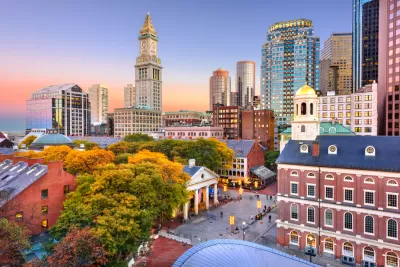The Boston Foundation's first Place Leadership Network process offers lessons in how to build place-based coalitions to advance the cause of equity.

The Boston Foundation is responding to the unequal economic, environmental, and cultural impacts of development in Boston by spearheading a new investments in "place governance," rather than the typical approach of placemaking interventions, through its Place Leadership Network program.
Philip Barash, a design fellow with the Boston Foundation, explains the Place Leadership Network program in a guest blog post for the Brookings Institution. The Foundation launched the Place Leadership Network in May 2019, announcing an application process to participate in the peer-learning initiative that eventually yielded eight teams.
"Participants would be compensated for their yearlong commitment and be eligible for unrestricted funding at the end of the year to support community-led placemaking and place-keeping agendas," explains Barash. Many of the selected teams represent organizations serving communities of color, are led by people of color, and work with small budgets. An article by Sandra Larson for Next City in July 2019 detailed the first cohort of the PLN program.
Barash includes a lot of detail about the curriculum of the nine-month PLN process, including how the curriculum changed as a result of the pandemic. The results were powerful, according to Barash, and point the direction for future efforts: "PLN demonstrated that community leaders can fully, confidently, and justly shape the futures of their shared places. Through the months, we kept hearing a similar refrain from the cohort: If Boston has any hope of altering development dynamics to center community interest and spatial justice, we need to continue shifting the power balance."
FULL STORY: How an equitable place governance pilot in Boston is shifting power balances

Planetizen Federal Action Tracker
A weekly monitor of how Trump’s orders and actions are impacting planners and planning in America.

Congressman Proposes Bill to Rename DC Metro “Trump Train”
The Make Autorail Great Again Act would withhold federal funding to the system until the Washington Metropolitan Area Transit Authority (WMATA), rebrands as the Washington Metropolitan Authority for Greater Access (WMAGA).

DARTSpace Platform Streamlines Dallas TOD Application Process
The Dallas transit agency hopes a shorter permitting timeline will boost transit-oriented development around rail stations.

San Francisco's School District Spent $105M To Build Affordable Housing for Teachers — And That's Just the Beginning
SFUSD joins a growing list of school districts using their land holdings to address housing affordability challenges faced by their own employees.

Car-Centric LA Suburb Looks to a Train-Oriented Future
City leaders in Rancho Cucamonga, the future western terminus of the Brightline West rail line to Las Vegas, want to reimagine the city as a transit-oriented, pedestrian-friendly community.

New Alaska Bitcoin Mine Would Burn as Much Energy as the State’s Largest Coal Plant
Fueled by “stranded” natural gas, the startup hopes to become the largest in the US, and to make Alaska an industry center.
Urban Design for Planners 1: Software Tools
This six-course series explores essential urban design concepts using open source software and equips planners with the tools they need to participate fully in the urban design process.
Planning for Universal Design
Learn the tools for implementing Universal Design in planning regulations.
Municipality of Princeton
Roanoke Valley-Alleghany Regional Commission
City of Mt Shasta
City of Camden Redevelopment Agency
City of Astoria
Transportation Research & Education Center (TREC) at Portland State University
US High Speed Rail Association
City of Camden Redevelopment Agency
Municipality of Princeton (NJ)





























